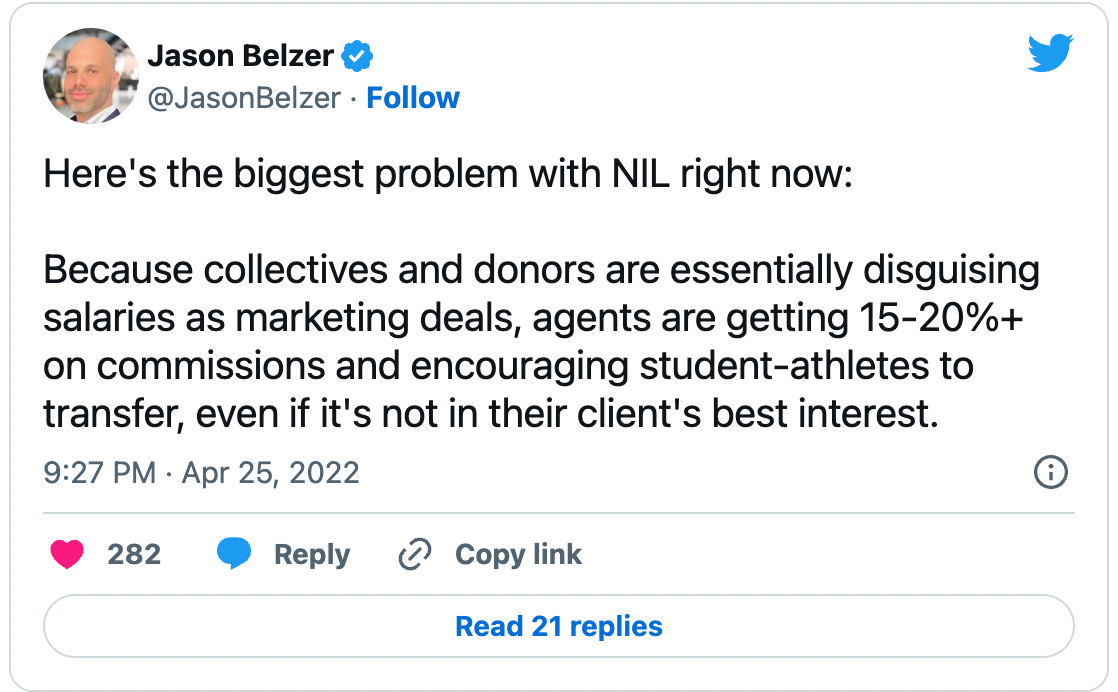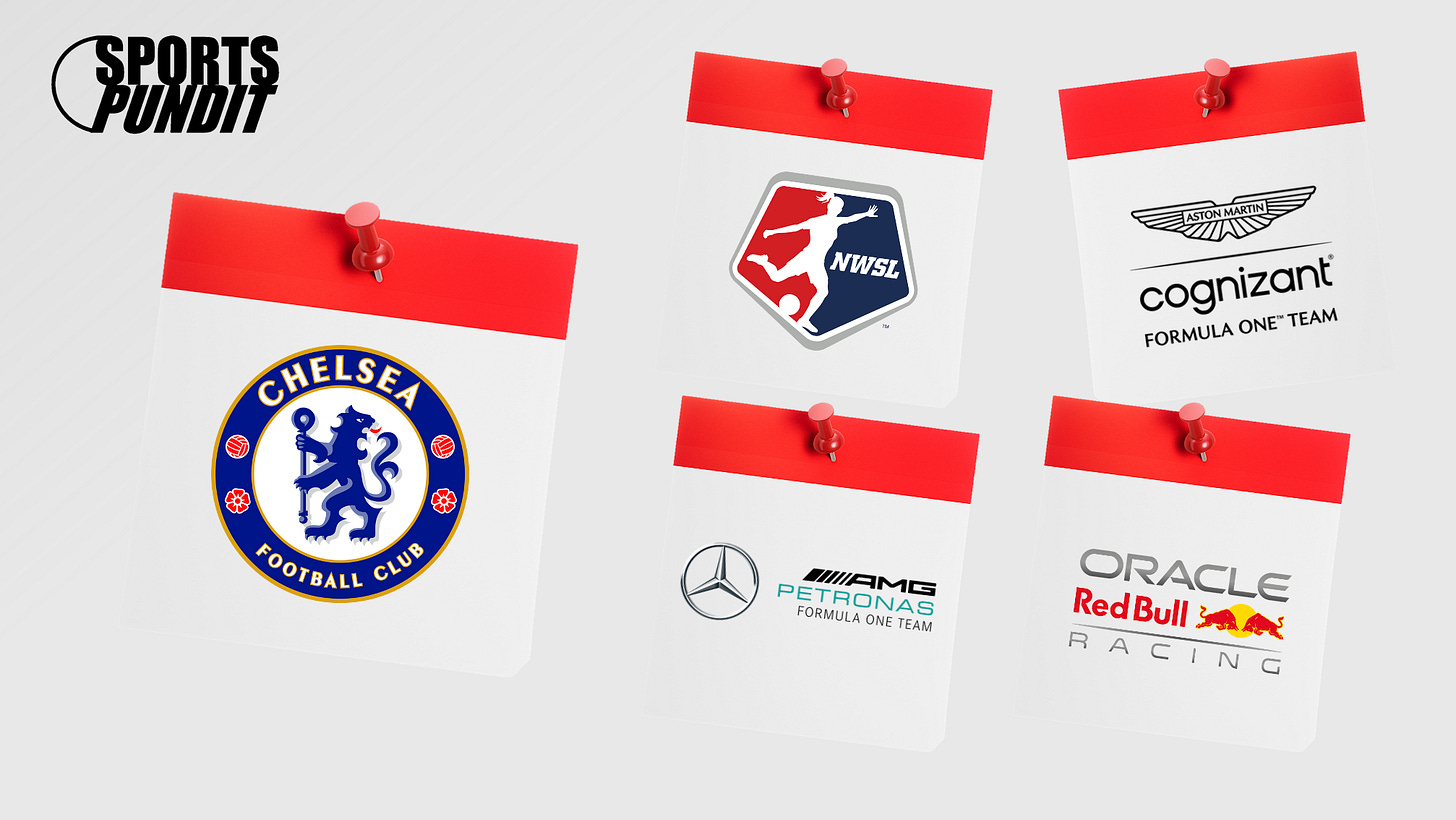Game of NIL: Addressing College Athletics' Curveballs ⚾️
While NIL has been a step in the right direction for better compensating college athletes, it has also led to a series of unforeseen consequences that the NCCA must address, writes J.R. McArdle
Not yet a subscriber? Join 1000+ sports business leaders, from the PFL to the Premier League, that read Sports Pundit every week to get impactful industry insights.
Sports Pundit MBA is an (approx) fortnightly series of content in partnership with the MBA Sport Business Alliance.
MBA SBA is comprised of current MBA students and alumni from 10 premier business schools across the United States.
Through this content partnership, I’m working directly with them to provide you with high-quality sports business content from a variety of sharp, next-gen perspectives.
This week’s member is J.R. McArdle, an MBA candidate at The University of Texas at Austin’s McCombs School of Business. A former Assurance Manager at EY, McArdle is hoping to pivot into a strategic role to solve complex problems within sport.
By J.R. McArdle
Two years ago, the NCAA released its interim policy concerning name, image, and likeness (NIL).
While what has followed has been a step in the right direction for better compensating college athletes in the U.S. (See: Texas Longhorns athletes have made over $15 million), the combination of wealthy college donors hijacking the system and the ability to now transfer colleges without sitting out a season has also created a series of unforeseen repercussions.
To address these issues, there is a growing consensus that the NCAA should focus on implementing three core changes in order to standardize and reform NIL:
Create Universal Rules
States have varying laws. This creates recruitment advantages for schools in certain states where laws are less restrictive. For example, New Mexico has enacted the least restrictive legislation as compared to a state like Pennsylvania where student-athletes cannot promote certain types of brands or states like West Virginia that rely on the NCAA’s interim policy.
This is something that The National College Players Association (NCPA) aims to address.
The NCPA aims “to provide college recruits and transfers with an additional level of consideration when weighing scholarship offers, based on how much liberty they have for profiting from their fame in different states.”
“In the same way that athletes weigh athletic facilities, scholarship offers, and college ranking as factors when making commitment decisions, they now have another category to evaluate: the states’ status of NIL legislation.”
Ramogi Huma, NCPA Executive Director
Instead of having state-level NIL policy, as NCPA contend, there should be universal Federal regulation to create a level playing field from a legal perspective. This proposal of universal legislation should be both possible and practical.
Tackle the ‘Donor Problem’
Critics argue that the universities with the largest resources and donors are buying high school recruits and attempting to poach student-athletes from other schools - which is not what NIL was meant to be, nor should it be.
As a result, money should be tracked, and collectives formed by donors and boosters should be eliminated. The motivation of NIL is to compensate athletes for their personality and popularity, not to support “pay to play” agreements.
To ensure compensation is received only from businesses that benefit from an athlete’s NIL, the NCAA should implement a platform to track athlete compensation received and the sources.
While potentially less feasible due to opposition from not only donors but also athletes because of the invasiveness, this action is necessary to address the direction that NIL is trending toward.
Crack Down on Athlete Tampering
Lastly, the NCAA must address the transfer portal.
Created for athletes seeking a better fit, the process has been hijacked by top schools seeking to poach talent.
While the reasons an athlete might transfer are a subjective area, transferring and communication should not be initiated by other schools. Increased monitoring of communication between athletes and other schools is vital to curtail tampering.
Full elimination of tampering will never be possible, but the NCAA needs to do more to oversee this process and additionally, to nail offenders with harsh penalties.
Conclusion
NIL is not perfect. It is, however, worth preserving as it not only greatly benefits the student-athletes but also college athletics more broadly.
Star players like Jac Caglianone of Florida may have skipped college baseball entirely and simply entered the MLB draft if it wasn’t for NIL. Furthermore, student-athletes who do attend college are staying longer - which leads to more athletes getting their degrees before trying to go pro.
We have seen this is especially true in basketball where college stars such as Drew Timme and Armando Bacot, who would typically enter the NBA draft after one year, are staying longer.
“I get a chance to get better, get my degree, be around all my friends, and then also make a lot of money.”
Armando Bacot to Sports Illustrated
Perhaps most importantly, NIL has enhanced athletes’ ability to control their own destiny. By providing them opportunities to earn, they can now afford to train and eat right, as well as engage with their community better, and learn how to become financially literate.
Many people said that NIL would kill amateurism and the pride of college athletics, but it is (for the most part) doing the opposite. For sure, there are challenges that need to be addressed, but with time and more knowledge, we can hope the NCAA will figure these out.
Not yet a subscriber? Join 1000+ sports business leaders, from the PFL to Premier League, that read Sports Pundit every week to get impactful industry insights.
JOB BOARD
Partner Manager - Mercedes-AMG PETRONAS Formula One Team (Brackley, UK)
Head of People Operations - Red Bull Racing (Milton Keynes, UK)
Digital Product Lead - Chelsea FC (London, UK)
Partnerships Marketing Manager - Aston Martin F1 Team (Silverstone, UK)
Player Services Manager - National Women’s Soccer League (New York, US)
Do you have a job you’d like to promote to the amazing readers of this newsletter? Drop me a note at andy@sportspundit.org
More on the MBA Sports Business Alliance…
MBA SBA is a mission-driven non-profit that is building an extensive pipeline of MBA talent within the sports industry from premier business schools, including;
Michigan Ross
Duke Fuqua
Texas McCombs
USC Marshall
UCLA Anderson
MIT Sloan
Vanderbilt Owen
NYU Stern
Notre Dame Mendoza
Oregon Lundquist
MBA SBA is guided by the core values of “Connect. Educate. Lead.” and prepares its members to become future sports business leaders by providing them access to best in class recruiting resources, educational events, and professional development opportunities.











